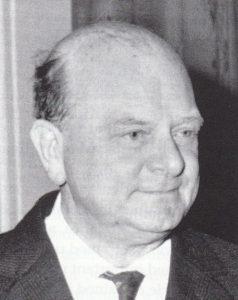
Malcolm Milne, one of the outstanding clinical scientists of his time, was born at Woodley, Cheshire, the son of Alexander Milne, a pharmaceutical chemist, and Clara, daughter of Thomas Gee, a farmer. He was educated at Stockport School and Manchester University, where he obtained first class honours in both the BSc and MB ChB.
During the war, he served as regimental medical officer and also in a field ambulance with the 8th Army in North Africa and Italy from 1940 to 1946. In 1943 he was mentioned in despatches for services in Tunisia.
After the war he returned to Manchester where, as lecturer in medicine, he collaborated with Douglas Black in experiments on potassium depletion, carried out on themselves. His aptitude for clinical research quickly became known and, in 1952, he was invited to join John McMichael’s department, later Sir John (q.v.), at the Postgraduate Medical School. There he was able to develop his interest in metabolic disorders and renal medicine and he published a series of important papers of which the most significant, in his own view, was that on the excretion of weak acids and bases.
In 1961 he became the first professor of medicine at Westminster Hospital medical school and accepted new responsibilities as teacher and clinician. As the former, it is not too much to say that he never gave a dull lecture; as the latter, with his encyclopaedic knowledge of medicine, his opinion was sought increasingly by colleagues in all specialties.
He continued his research and in 1963 he gave the Bradshaw lecture on disorders of amino-acid transport. Further distinctions followed: he served on the Senate of London University, became senior censor at the College in 1979 and was elected a Fellow of the Royal Society in 1978.
He was a popular figure in the medical school, where he spent the last 20 years of his career and he spiced his activities with a degree of eccentricity which endeared him to colleagues and students alike. Though no athlete, he was a regular attender at Hospital Cup rugby matches and his appearances as opening batsman in the staff cricket matches, unfortunately brief, went far beyond the call of duty.
In 1941 he had married Mary, daughter of Matthias Thorpe, a printer and dyer. They had a son and a daughter. He was a modest man despite his great intellectual gifts and one of absolute integrity. Though reserved and slow to smile, he was capable of great geniality as a family man and host; his interest in haute cuisine was of the ‘do-it-yourself’ variety.
[Brit.med.J., 1991,303,1056-7;The Independent, 11 Apr 1991; The Guardian, 10 Apr 1991;Photo]
Courtesy Royal College of Physicians London, Munk’s Roll, Volume IX, page 367